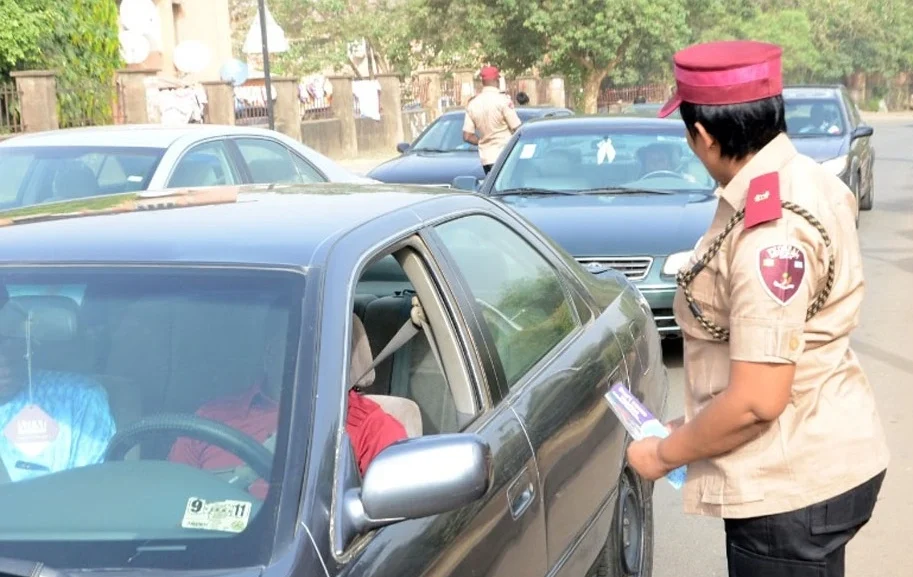Who issues vehicle plate numbers in Nigeria? This is an important question that car owners in Nigeria often ask. In Nigeria, vehicle plate numbers are important for vehicle identification and registration.
Vehicle plate numbers are significant in maintaining order and security on Nigerian roads.
However, issuing these plate numbers is a structured process managed by specific governmental bodies. The aim is to ensure compliance with national and international standards.
We will walk you through who issues plate numbers for cars in Nigeria as you read on.
READ ALSO:
- How to Check Car Papers Online in Nigeria
- Steps to Renewal of Car Papers in Nigeria
- How Much to Renew Car Papers in Abuja?
- How Much to Renew Car Papers in Lagos in 2024?
- Fine for Expired Car Papers in Nigeria 2024
- How to Get Car Papers if Lost in Nigeria
Who Issues Vehicle Plate Number
So, when asked “who issues vehicle plate number in Nigeria?”, your answer should be The Federal Road Safety Corps (FRSC) in Nigeria is the agency in charge of the issuing of vehicle plate numbers.
It was established in 1988. The FRSC is tasked with making the highways safe for motorists and other road users.
It also educates drivers and the public on road safety, enforces road traffic laws, and ensures the smooth functioning of vehicle registration processes.
The FRSC operates under the Federal Ministry of Transportation. It ensures that vehicle registration and the issuance of plate numbers adhere to uniform standards across the country.
The corps has regional and state offices that facilitate the registration process, making it accessible to vehicle owners nationwide.
The Vehicle Inspection Officers (VIO)
While the FRSC is the primary body that issues vehicle plate number, the Vehicle Inspection Officers (VIO), operating under the state Ministries of Transportation, also play a significant role in the registration process.
VIOs are responsible for inspecting vehicles to ensure they meet safety standards before they can be registered and issued plate numbers. They work with the FRSC to maintain road safety and vehicle standards.
The Process of Issuing Vehicle Number
The process of issuing vehicle plate numbers in Nigeria involves several steps:
- Vehicle Inspection: The vehicle must first pass an inspection by the VIO to ensure it meets safety and environmental standards.
- Documentation: The vehicle owner must provide necessary documentation, including proof of ownership, a valid driver’s license, and a completed vehicle registration form.
- Payment of Fees: The owner must pay the appropriate fees for registration and plate issuance. These fees vary depending on the type of vehicle and its intended use.
- Allocation of Plate Number: Once the documentation is verified and the fees are paid, the FRSC allocates a unique plate number to the vehicle. This number is recorded in the national vehicle database to ensure traceability and accountability.
- Issuance of Plate and Registration Certificate: The FRSC issues the physical plate number and a registration certificate to the vehicle owner. The plate number must be affixed to the vehicle as per the guidelines provided by the FRSC.
Special Plate Numbers
In addition to standard plate numbers, Nigeria also issues special plate numbers for various purposes. Some of these are:
- Government Vehicles: These have unique identifiers to distinguish them from private vehicles.
- Commercial Vehicles: Plate numbers for commercial vehicles, such as taxis and buses, often have different colour schemes and numbering patterns.
- Custom and Personalized Plates: Vehicle owners can apply for custom or personalized plate numbers for an additional fee. These plates typically feature unique letter and number combinations chosen by the owner, subject to approval by the FRSC.
What are the Challenges of Issuing Vehicle Plate Numbers in Nigeria?
Apart from asking “who issues vehicle plate number in Nigeria?” you should also know that the process of issuing vehicle plate numbers in Nigeria has faced several challenges, including:
- Corruption and Fraud: There have been instances of fraudulent issuance of plate numbers and corruption within the agencies involved.
- Inadequate Infrastructure: Limited infrastructure and resources can delay the registration and issuance process, causing inconvenience to vehicle owners.
However, to address these challenges, the Nigerian government and the FRSC have implemented several measures:
- Digitalization: The introduction of digital systems for vehicle registration and plate issuance has streamlined the process and reduced opportunities for corruption.
- Public Awareness Campaigns: Educating the public about the proper procedures and the importance of vehicle registration has improved compliance and reduced fraud.
- Enhanced Training: Continuous training for FRSC and VIO personnel ensures they are up-to-date with the latest regulations and technologies.
In conclusion, when you ask “Who Issues Vehicle Plate Number in Nigeria?” know that the issuing of vehicle plate numbers in Nigeria is a vital function managed primarily by the FRSC, with support from the VIO and other state agencies.
READ ALSO:
- What to Do if Car Papers are Lost
- Can a Car be Registered Twice in Nigeria?
- What are the Complete Vehicle Papers in Nigeria?
- What is the Cost of Change Ownership of a Car in Nigeria?
- How to Obtain New Proof of Ownership in Nigeria
- How to Check Registered Plate Numbers in Nigeria?
This structured process ensures that vehicles on Nigerian roads are registered, identifiable, and meet safety standards.
It contributes to the overall safety and orderliness of the nation’s transportation system. Despite challenges, ongoing improvements and reforms aim to make the process more efficient, transparent, and accessible to all vehicle owners.




